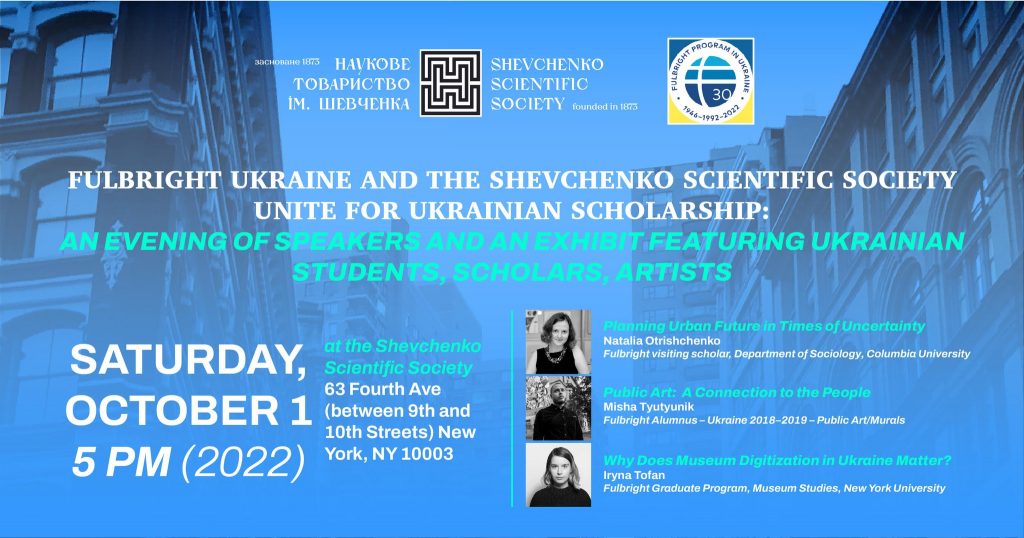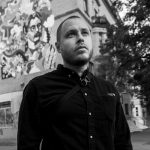« All Events
Fulbright Ukraine and the Shevchenko Scientific Society Unite for Ukrainian Scholarship: An Evening of Speakers and Exhibit Featuring Ukrainian Students, Scholars, Artists
Presenter(s): Shevchenko Scientific Society, Fullbright Program in Ukraine
October 1, 2022 @ 5:00 pm - 7:00 pm

Saturday, October 1, 2022, 5 PM
Shevchenko Scientific Society
63 Fourth Ave (between 9th and 10th Streets)New York, NY10003
Opening remarks:
Halyna Hryn President, Shevchenko Scientific Society in the US
Jessica Zychowycz Director, The Fulbright Program in Ukraine
Presentations:
Planning Urban Future in Times of Uncertainty
Natalia Otrishchenko
Fulbright visiting scholar, Department of Sociology, Columbia University
Public Art: A Connection to the People
Misha Tyutyunik
Fulbright Alumnus – Ukraine 2018–2019 – Public Art/Murals
Why Does Museum Digitization in Ukraine Matter?
Iryna Tofan
Fulbright Graduate Program, Museum Studies, New York University
The brutal, genocidal Russian-Ukrainian war has not spared Ukrainian scholarship and arts. Many institutions are in the process of being destroyed and thousands of Ukrainian scholars and artists find themselves displaced both inside and outside the borders of their homeland. Still others are making the ultimate sacrifice, fighting on the front lines. It is essential to the mission of the Shevchenko Scientific Society and the Fulbright program that Ukrainian scholarship and arts continue to thrive. To that end, we have joined forces to present an evening of lectures and an art exhibition featuring Fulbright fellows, as Fulbright Ukraine celebrates its 30th anniversary and the Shevchenko Scientific Society reports on its Emergency Fund, which has already disbursed its first 50 awards to Ukrainian scholars in need.We look forward to meeting the dozens of Ukrainian scholars now placed at universities in the New York area, as well as Fulbright alumni, Shevchenko Society members, and members of the New York community. We hope that our gathering of organizations, scholars, and artists from around the world will help nurture the forces that Ukraine now so needs. As always, we invite your donations and your support. All proceeds will go to support scholars and artists in Ukraine.
ART EXHIBIT. BOOK DISPLAY. RECEPTION.
Capacity is limited: Kindly RSVP at info@shevchenko.org
 Natalia Otrishchenko is a research fellow at the Center for Urban History in Lviv and an associate researcher at the Center for Contemporary History in Potsdam. She holds a Ph.D. in Sociology (2015, Institute of Sociology, the National Academy of Sciences of Ukraine). Since March 2022, Natalia has led the Ukrainian team within the “24/02/22, 5 am” international documentation initiative. This Fall, she is a Fulbright visiting scholar at the Department of Sociology, Columbia University. Natalia is interested in sociological research methods, oral history, urban sociology, spatial and social transformations after state socialism.
Natalia Otrishchenko is a research fellow at the Center for Urban History in Lviv and an associate researcher at the Center for Contemporary History in Potsdam. She holds a Ph.D. in Sociology (2015, Institute of Sociology, the National Academy of Sciences of Ukraine). Since March 2022, Natalia has led the Ukrainian team within the “24/02/22, 5 am” international documentation initiative. This Fall, she is a Fulbright visiting scholar at the Department of Sociology, Columbia University. Natalia is interested in sociological research methods, oral history, urban sociology, spatial and social transformations after state socialism.
Planning Urban Future During Times of Uncertainty
First the COVID-19 pandemic and later the full-scale Russian invasion in Ukraine showed how fragile our plans could be, and the planning became a privilege. Can we still plan the future, which most likely will be the urban future? Since February 24, 2022, Ukrainian cities and villages have been experiencing large-scale destruction. Constant artillery shelling, hundreds of missiles, and bombs are destroying human lives, housing, infrastructures, communal utilities, nature, social and spatial organization in general. Part of Ukrainian territory is still under occupation. Ukrainian society mobilized to face the aggression and to support those in need. Dreaming about our independent and peaceful future is part of our resistance.What kind of planning do we need for this future? Who is going to be involved in decision-making? How should this planning be organized? What principles should be embedded in it? What are the sources of inspiration and models for reflections? And who will be considered an expert in this discussion?
 Misha Tyutyunik is a Ukrainian-born painter, muralist, street artist, illustrator, and most recently, virtual reality artist, living and working out of Brooklyn, New York.A graduate of Pratt Institute, he travels the world creating murals and is regularly commissioned to paint and illustrate for many reputable brands, publications and collectors. Misha has recently completed a Fulbright Grant abroad in Ukraine, and was one of five artists chosen to paint a sanitation vehicle for the NYC Dept. of Sanitation as part of their ‘trucks of art’ initiative.
Misha Tyutyunik is a Ukrainian-born painter, muralist, street artist, illustrator, and most recently, virtual reality artist, living and working out of Brooklyn, New York.A graduate of Pratt Institute, he travels the world creating murals and is regularly commissioned to paint and illustrate for many reputable brands, publications and collectors. Misha has recently completed a Fulbright Grant abroad in Ukraine, and was one of five artists chosen to paint a sanitation vehicle for the NYC Dept. of Sanitation as part of their ‘trucks of art’ initiative.
Public Art: A Connection to the People
As someone who was born in Ukraine and spent their childhood in Kyiv, it was important to me to go back and reconnect with my roots, as well as develop a connection to the land and the people through my public art practice. During my Fulbright year in Ukraine, and to the present moment, I have been fortunate to work with many Ukrainian communities, curators, historians and local officials to create large scale murals that celebrate Ukrainian culture, history and people. It is my view that public art should be made with and for the public; otherwise it ceases to be ‘public’ art. This was my approach to every project that I worked on during my Fulbright, and how I continue to work on public art now.
 Iryna Tofan Museum Studies MA student at NYU, a background in Theory and History of Art. Former Communication manager at the National Art Museum of Ukraine and former Research Fellow at the Pinchuk Art Center Research Platform. Lecturer and writer on contemporary Ukrainian and international art for various Ukrainian media. Current research focuses on Museum Digitization and Digital Archives.
Iryna Tofan Museum Studies MA student at NYU, a background in Theory and History of Art. Former Communication manager at the National Art Museum of Ukraine and former Research Fellow at the Pinchuk Art Center Research Platform. Lecturer and writer on contemporary Ukrainian and international art for various Ukrainian media. Current research focuses on Museum Digitization and Digital Archives.
Why does Museum Digitization in Ukraine matter?
Although the digitization of museums’ collections in Ukraine is not a priority now, it is an important task for the near future. In most cases, only 1–2% of the museum collection in Ukraine is on permanent display due to the available exhibition space, while the remaining thousands of artworks are mostly available to employees or researchers who have special access. The fact that collections and archives remain analog means that they are vulnerable and inaccessible.
Donate to support Ukrainian scholars and artists through the Shevchenko Emergency Fund HERE, or mail your check to
Shevchenko Scientific Society, Inc.
63 4th Ave.
New York, NY 10003
For more information please contact 212-254-5130 or info@shevchenko.org



 Natalia Otrishchenko is a research fellow at the Center for Urban History in Lviv and an associate researcher at the Center for Contemporary History in Potsdam. She holds a Ph.D. in Sociology (2015, Institute of Sociology, the National Academy of Sciences of Ukraine). Since March 2022, Natalia has led the Ukrainian team within the “24/02/22, 5 am” international documentation initiative. This Fall, she is a Fulbright visiting scholar at the Department of Sociology, Columbia University. Natalia is interested in sociological research methods, oral history, urban sociology, spatial and social transformations after state socialism.
Natalia Otrishchenko is a research fellow at the Center for Urban History in Lviv and an associate researcher at the Center for Contemporary History in Potsdam. She holds a Ph.D. in Sociology (2015, Institute of Sociology, the National Academy of Sciences of Ukraine). Since March 2022, Natalia has led the Ukrainian team within the “24/02/22, 5 am” international documentation initiative. This Fall, she is a Fulbright visiting scholar at the Department of Sociology, Columbia University. Natalia is interested in sociological research methods, oral history, urban sociology, spatial and social transformations after state socialism. Misha Tyutyunik is a Ukrainian-born painter, muralist, street artist, illustrator, and most recently, virtual reality artist, living and working out of Brooklyn, New York.A graduate of Pratt Institute, he travels the world creating murals and is regularly commissioned to paint and illustrate for many reputable brands, publications and collectors. Misha has recently completed a Fulbright Grant abroad in Ukraine, and was one of five artists chosen to paint a sanitation vehicle for the NYC Dept. of Sanitation as part of their ‘trucks of art’ initiative.
Misha Tyutyunik is a Ukrainian-born painter, muralist, street artist, illustrator, and most recently, virtual reality artist, living and working out of Brooklyn, New York.A graduate of Pratt Institute, he travels the world creating murals and is regularly commissioned to paint and illustrate for many reputable brands, publications and collectors. Misha has recently completed a Fulbright Grant abroad in Ukraine, and was one of five artists chosen to paint a sanitation vehicle for the NYC Dept. of Sanitation as part of their ‘trucks of art’ initiative. Iryna Tofan Museum Studies MA student at NYU, a background in Theory and History of Art. Former Communication manager at the National Art Museum of Ukraine and former Research Fellow at the Pinchuk Art Center Research Platform. Lecturer and writer on contemporary Ukrainian and international art for various Ukrainian media. Current research focuses on Museum Digitization and Digital Archives.
Iryna Tofan Museum Studies MA student at NYU, a background in Theory and History of Art. Former Communication manager at the National Art Museum of Ukraine and former Research Fellow at the Pinchuk Art Center Research Platform. Lecturer and writer on contemporary Ukrainian and international art for various Ukrainian media. Current research focuses on Museum Digitization and Digital Archives.